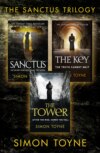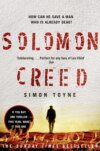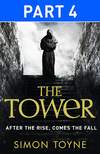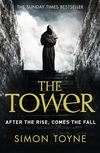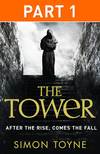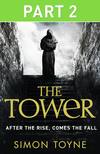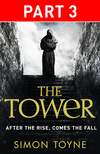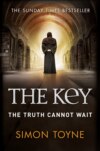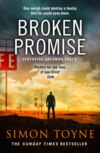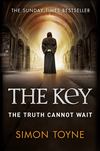Buch lesen: «Bestselling Conspiracy Thriller Trilogy: Sanctus, The Key, The Tower»
BESTSELLING CONSPIRACY THRILLER TRILOGY: Sanctus, The Key, The Tower
Simon Toyne

FOREWORD
In the last week of May 2006 I decided to burn my life down.
The weather was warm, the sky was blue, and to the casual observer it probably seemed that my world did not particularly need torching. I was thirty-eight, had worked as a producer, director and writer in television for almost twenty years and in that time I had travelled the world, won some awards, made a good living and carved a fairly decent if unspectacular career. I had a lovely wife, a funny, clever little three year old with blonde ringlets and huge green eyes, and my baby boy had just been born. And it was the baby, in the end, that made me reach for the matches.
At the time of his birth I was producing a sort of talent show for inventors called ‘The Big Idea’, which was about as good as it sounds. And because it was live and because when you’re employed by someone else you have to do what they tell you, I wasn’t allowed to take any time off. My son had just been born and I couldn’t be there, not for him, not for my wife and not for my daughter, whose world had been invaded by a tiny, bald, crying thing.
I managed to sneak a few days at home – most of which I spent on the phone to the production office – and as I juggled a sleeping baby and a phone so hot it was cooking my ear, just to make a programme no one was going to see, I felt a growing sense of anger and frustration. I could sense the ghost of my eighteen-year-old self, watching me from the shadows, his brow knitted in fury and confusion, his unlined face incredulous at what he had become. That version of me had envisaged novels and film scripts and movies in his future. That version had a deep love of language and a desire to use it to tell stories, big stories on grand, vivid canvasses. He had not imagined arriving at the sharp end of thirty to find himself writing weak jokes about nerds in sheds for a cable channel. Something had to change. A bonfire needed to be built around all the pointless stuff I had somehow exchanged his dreams for.
The first thing I did was talk it all through with my wife, who, being lovely, realised that I was deeply unhappy and needed to do something about it, even though we now had two small mouths to feed as well as too big a mortgage on a house that was not quite big enough. She did a deal with me. She said she’d give me five years or three books to try and make a go of it. In that time I would spend six months of each year writing and the other six doing freelance TV jobs to bring some money in. Suddenly there was light in my professional darkness. We started saving and I began to think about what sort of story I was going to write. I also began to read lots of thrillers.
I have always loved thrillers, I love the mechanics of them and the addictive nature of reading a good one. The narrative structure of commercial television is not dissimilar. In both you have to grab the reader or viewer and hold on to them as tightly as you can, constantly re-engaging them and staying one or two steps ahead.
I discovered Lee Child, who was not quite so well known then. I remember burning through Killing Floor (his debut), then discovering that he was English and had worked for twenty years in British commercial television before writing his first novel. I took this to be a sign and carried on plotting and building my fire.
I also read a lot of advice for first time novelists, most of which seemed to agree that the best thing to do was to write what you know, stick close to your own experience so you can just concentrate on the writing. With this in mind I started developing a couple of ideas, both of which were contemporary thrillers revolving around an ordinary man, a bit like me, who is thrust into extraordinary situations. I figured this way I could keep my research to a minimum and make the most of the six months I planned to spend writing.
Then I struck the match and quit my job.
My bosses offered me a sabbatical but I turned it down, knowing that writing a book would be hard and having a safety net would make it easier to give up. I had read an interview with Lee Child where he’d said he’d written his first book as if his life depended on it. I could see the wisdom in that. I needed to do the same thing if I wanted to have the slightest chance of succeeding. And if I ultimately failed, I wanted it to be an honest failure with no excuses. That way I could at least look my eighteen-year-old self in the eye and say ‘Listen, we gave it our best shot. We just weren’t good enough.’
So, at the end of November 2007, I found myself aged thirty-nine with no job, sitting behind the wheel of a second-hand white transit van packed mostly with children’s books and toys. I was parked at the Newhaven ferry terminal waiting to board the midnight ferry. My wife was behind me in our car, also packed with various worldly goods. As part of the ‘burning down our life to see what was left’ pledge we had decided to rent out our flat in England and go and live in France for six months. The kids were still young enough for school terms not to be a problem and I figured if I was going to spend more time with my family I might as well do it somewhere exotic.
We were travelling in November because it’s much cheaper to rent somewhere in France in the winter than it is in the summer and the money we had saved needed to last. The plan was for my wife and I to sleep during the night crossing then drive for eight hours to our rented house in the Tarn and fill it full of familiar things in time for the arrival of our kids a couple of days later, who were flying over with friends.
Unfortunately we sailed into a force eight gale, which battered the ferry and ensured we got no sleep at all. We arrived in Dieppe in no shape to attempt an eight-hour drive, so we headed to Rouen instead, looking for a cheap hotel. And as we drove into the outskirts of the city, and dawn began to lighten the sky, I saw the spires of Rouen Cathedral and a Ralph Waldo Emerson quote I had always liked popped into my head. ‘A man is a god in ruins’. It could have been my tiredness, or the sense-sharpened state you can only achieve by stepping out of a comfortable place, but something about the spires and that quote meshed together to form the seed of a new idea.
We got some sleep and set off again, and the radio promptly broke in the van leaving me in silence for the entire eight-hour drive. And in that silence I kept thinking about the silhouette of the cathedral and the quote. By the time we got to the house that was going to be home for the next six months I had the framework of what eventually became Sanctus. It wasn’t small and semi-autobiographical. It was big, really big, with the whole of human history as its back-story and the end of days as its conclusion. It would require extensive research and ultimately the construction of an entire city, architecture, history and all. In short, it was not the sort of book I had intended to write – it wasn’t even the sort of book I thought I was capable of writing – but it was by far the best idea I had, so I started writing it.
We had a glorious six months, hanging out with each other, having winter fires then barbeques outside when the weather started to turn. The neat twisted lines of dead-looking sticks in the fields around us sprouted green fuzz then flowers then miniature bunches of hard, green grapes. The cherry crop came like a sugary wave that we bottled and made into jam and ate straight from the trees, and then the figs started to ripen and the grapes began to darken and swell. And when the money ran out and we had to come home I had written the first hundred and eighty pages of a book I called Ruin after the city I’d made up.
It took me another year in between TV jobs to finish a first draft, then another year of sending it out to agents and doing another six or seven major redrafts guided by the one I thankfully got before it was ready to be sent out to publishers with a new title.
Sanctus – as Ruin became – was translated into twenty-seven languages and published all over the world and as a result of its success I now write full time. When my third child was born in 2012 – another curly-haired girl with big eyes – I was there every day from the moment she appeared to right now as I write these words.
The ghost of my eighteen-year-old self is gone and that big unwieldy idea I had, the one I wasn’t even sure I should tackle, grew from one book to three. So here they are for you now, a story of destiny and identity and taking risks. And it seems I did follow that advice to debut writers after all. I wrote what I knew.
Simon Toyne
Brighton
Nov 2013
Table of Contents
Cover
Title Page
Foreword from Simon
Sanctus
The Key
The Tower
About the Author
Also by Simon Toyne
Copyright
About the Publisher



To K For the adventure
Table of Contents
Cover
Title Page
Dedication
Map
Part I
Chapter 1
Chapter 2
Chapter 3
Chapter 4
Chapter 5
Chapter 6
Chapter 7
Chapter 8
Chapter 9
Chapter 10
Chapter 11
Chapter 12
Chapter 13
Chapter 14
Chapter 15
Chapter 16
Chapter 17
Chapter 18
Chapter 19
Chapter 20
Chapter 21
Chapter 22
Chapter 23
Chapter 24
Chapter 25
Chapter 26
Chapter 27
Chapter 28
Chapter 29
Part II
Chapter 30
Chapter 31
Chapter 32
Chapter 33
Chapter 34
Chapter 35
Chapter 36
Chapter 37
Chapter 38
Chapter 39
Chapter 40
Chapter 41
Chapter 42
Chapter 43
Chapter 44
Chapter 45
Chapter 46
Chapter 47
Chapter 48
Chapter 49
Part III
Chapter 50
Chapter 51
Chapter 52
Chapter 53
Chapter 54
Chapter 55
Chapter 56
Chapter 57
Chapter 58
Chapter 59
Chapter 60
Chapter 61
Chapter 62
Chapter 63
Chapter 64
Chapter 65
Chapter 66
Chapter 67
Chapter 68
Part IV
Chapter 69
Chapter 70
Chapter 71
Chapter 72
Chapter 73
Chapter 74
Chapter 75
Chapter 76
Chapter 77
Chapter 78
Chapter 79
Chapter 80
Chapter 81
Chapter 82
Chapter 83
Chapter 84
Chapter 85
Chapter 86
Chapter 87
Chapter 88
Chapter 89
Chapter 90
Chapter 91
Chapter 92
Chapter 93
Chapter 94
Chapter 95
Chapter 96
Chapter 97
Chapter 98
Chapter 99
Part V
Chapter 100
Chapter 101
Chapter 102
Chapter 103
Chapter 104
Chapter 105
Chapter 106
Chapter 107
Chapter 108
Chapter 109
Chapter 110
Chapter 111
Chapter 112
Chapter 113
Chapter 114
Chapter 115
Chapter 116
Chapter 117
Chapter 118
Chapter 119
Chapter 120
Chapter 121
Part VI
Chapter 122
Chapter 123
Chapter 124
Chapter 125
Chapter 126
Chapter 127
Chapter 128
Chapter 129
Chapter 130
Chapter 131
Chapter 132
Chapter 133
Chapter 134
Chapter 135
Chapter 136
Chapter 137
Chapter 138
Chapter 139
Chapter 140
Chapter 141
Chapter 142
Chapter 143
Chapter 144
Part VII
Chapter 145
Chapter 146
Chapter 147
Acknowledgements
Copyright

I
A man is a god in ruins
RALPH WALDO EMERSON
1
A flash of light filled his skull as it struck the rock floor.
Then darkness.
He was dimly aware of the heavy oak door banging shut behind him and a thick batten sliding through iron hasps.
For a while he lay where he’d been thrown, listening to the pounding of his pulse and the mournful wind close by.
The blow to his head made him feel sick and dizzy, but there was no danger he was going to pass out; the agonizing cold would see to that. It was a still and ancient cold, immutable and unforgiving as the stone the cell was carved from. It pressed down and wrapped itself round him like a shroud, freezing the tears on his cheeks and beard, chilling the blood that trickled from the fresh cuts he himself had inflicted on his exposed upper body during the ceremony. Pictures tumbled through his mind, images of the awful scenes he had just witnessed and of the terrible secret he had learned.
It was the culmination of a lifetime of searching. The end of a journey he had hoped would lead to a sacred and ancient knowledge, to a divine understanding that would bring him closer to God. Now at long last he had gained that knowledge, but he had found no divinity in what he had seen, only unimaginable sorrow.
Where was God in this?
The tears stung fresh and the cold sank deeper into his body, tightening its grip on his bones. He heard something on the other side of the heavy door. A distant sound. One that had somehow managed to find its way up through the honeycomb of hand-carved tunnels which riddled the holy mountain.
They’ll come for me soon.
The ceremony will end. Then they will deal with me …
He knew the history of the order he had joined. He knew their savage rules – and now he knew their secret. They’d kill him for sure. Probably slowly, in front of his former brothers, a reminder of the seriousness of their collective, uncompromising vows: a warning of what would happen if you broke them.
No!
Not here. Not like this.
He pressed his head against the cold stone floor then pushed himself up on all fours. Slowly and painfully he dragged the rough green material of his cassock back over his shoulders, the coarse wool scouring the raw wounds on his arms and chest. He pulled the cowl over his head and collapsed once more, feeling his warm breath through his beard, drawing his knees tightly under his chin and lying clenched in the foetal position until the warmth began to return to the rest of his body.
More noises echoed from somewhere within the mountain.
He opened his eyes and began to focus. A faint glow of distant light shone through a narrow window just enough to pick out the principal features of his cell. It was unadorned, rough-hewn, functional. A pile of rubble lay strewn across one corner, showing it was one of the hundreds of rooms no longer regularly used or maintained in the Citadel.
He glanced back at the window; little more than a slit in the rock, a loophole carved countless generations earlier to give archers a vantage point over enemy armies approaching across the plains below. He rose stiffly to his feet and made his way towards it.
Dawn was still some way off. There was no moon, just distant stars. Nevertheless when he looked through the window the sudden glare was enough to make him squint. It came from the combined light of tens of thousands of street lamps, advertising hoardings and shop signs stretching out far below him towards the rim of distant mountains surrounding the plain on all sides. It was the fierce and constant glow of the modern city of Ruin, once the capital of the Hittite Empire, now just a tourist destination in southern Turkey, on the furthest edge of Europe.
He looked down at the metropolitan sprawl, the world he had turned his back on eight years previously in his quest for truth, a quest that had led him to this lofty, ancient prison and a discovery that had torn apart his soul.
Another muffled sound. Closer this time.
He had to be quick.
He unthreaded the rope belt from the leather loops of his cassock. With a practised dexterity he twisted each end into a noose then stepped to the window and leaned through, feeling the frozen rock face for a crag or outcrop that might hold his weight. At the highest point of the opening he found a curved protrusion, slipped one noose around it and leaned back, tightening it, testing its strength.
It held.
Tucking his long, dirty blonde hair behind his ears he gazed down one last time at the carpet of light pulsating beneath him. Then, his heart heavy from the weight of the ancient secret he now carried, he breathed out as far as his lungs would allow, squeezed through the narrow gap, and launched himself into the night.
2
Nine floors down, in a room as grand and ornate as the previous one was meagre and bare, another man delicately washed the blood from his own freshly made cuts.
He knelt in front of a cavernous fireplace, as if in prayer. His long hair and beard were silvered with age and the hair on top of his head was thin, giving him a naturally monastic air in keeping with the green cassock gathered about his waist.
His body, though stooped with the first hint of age, was still solid and sinewy. Taut muscles moved beneath his skin as he dipped his square of muslin methodically into the copper bowl beside him, gently squeezing out the cool water before dabbing his weeping flesh. He held the poultice in place for a few moments each time, then repeated the ritual.
When the cuts on his neck, arms and torso had started to heal he patted himself dry with fresh, soft towels and rose, carefully pulling his habit back over his head, feeling the strangely comforting sting of his wounds beneath the coarse material. He closed his pale grey eyes, the colour of parched stone, and took a deep breath. He always felt a profound sense of calm immediately after the ceremony, a sense of satisfaction that he was upholding the greatest tradition of his ancient order. He tried to savour it for as long as possible before his temporal responsibilities dragged him back to the earthbound realities of his office.
A timid knock on the door disturbed this reverie.
Tonight his beatific mood was obviously going to be short-lived.
‘Enter.’ He reached for the rope belt draped over the back of a nearby chair.
The door opened, catching the light from the crackling fire on its carved and gilded surface. A monk slipped silently into the room, gently closing the door behind him. He too wore the green cassock and long hair and beard of their ancient order.
‘Brother Abbot …’ His voice was low, almost conspiratorial. ‘Forgive my intrusion at this late hour – but I thought you should know immediately.’
He dropped his gaze and studied the floor, as if uncertain how to continue.
‘Then tell me immediately,’ growled the Abbot, tying the belt round his waist and tucking in his Crux – a wooden cross in the shape of the letter ‘T’.
‘We have lost Brother Samuel …’
The Abbot froze.
‘What do you mean, “lost”? Has he died?’
‘No, Brother Abbot. I mean … he is not in his cell.’
The Abbot’s hand tightened on the hilt of his Crux until the grain of the wood pressed into his palm. Then, as logic quickly allayed his immediate fears, he relaxed once more.
‘He must have jumped,’ he said. ‘Have the grounds searched and the body retrieved before it is discovered.’
He turned and adjusted his cassock, expecting the man to hurry from the room.
‘Forgive me, Brother Abbot,’ the monk continued, staring more intently at the floor, ‘but we have already conducted a thorough search. We informed Brother Athanasius the moment we discovered Samuel was missing. He made contact with the outside and they instigated a sweep of the lower foundations. There’s no sign of a body.’
The calmness the Abbot had enjoyed just a few minutes previously had now entirely evaporated.
Earlier that night Brother Samuel had been inducted into the Sancti, the inner circle of their order; a brotherhood so secret only those living within the cloistered halls of the mountain knew of its continued existence. The initiation had been carried out in the traditional manner, finally revealing to the groomed monk the ancient Sacrament, the holy secret their order had been formed to protect and maintain. Brother Samuel had demonstrated during the ceremony that he was not equal to this knowledge. It was not the first time a monk had been found wanting at the moment of revelation. The secret they were bound to keep was powerful and dangerous, and no matter how thoroughly the newcomer had been prepared, when the moment came it was sometimes simply too much. Regrettably, someone who possessed the knowledge but could not carry the burden of it was almost as dangerous as the secret itself. At such times it was safer, perhaps even kinder, to end that person’s anguish as quickly as possible.
Brother Samuel had been such a case.
Now he had gone missing.
As long as he was at liberty, the Sacrament was vulnerable.
‘Find him,’ the Abbot said. ‘Search the grounds again, dig them up if you have to, but find him.’
‘Yes, Brother Abbot.’
‘Unless a host of angels passed by and took pity on his wretched soul he must have fallen and he must have fallen nearby. And if he hasn’t fallen then he must be somewhere in the Citadel. So secure every exit and conduct a room-by-room sweep of every crumbling battlement and bricked-up oubliette until you find either Brother Samuel or Brother Samuel’s body. Do you understand me?’
He kicked the copper bowl into the fire. A cloud of steam erupted from its raging heart, filling the air with an unpleasant metallic tang. The monk continued to stare at the floor, desperate to be dismissed, but the Abbot’s mind was elsewhere.
As the hissing subsided and the fire settled, so it seemed did the Abbot’s mood.
‘He must have jumped,’ he said at length. ‘So his body has to be lying somewhere in the grounds. Maybe it got caught in a tree. Perhaps a strong wind carried it away from the mountain and it now lies somewhere we have not yet thought to look; but we need to find it before dawn brings the first coachload of gawping interlopers.’
‘As you wish.’
The monk bowed and made ready to leave, but a knock on the door startled him afresh. He looked up in time to see another monk sweep boldly into the room without waiting for the Abbot to bid him enter. The new arrival was small and slight, his sharp features and sunken eyes giving him a look of haunted intelligence, like he understood more than he was comfortable with; yet he exuded quiet authority, even though he wore the brown cassock of the Administrata, the lowliest of the guilds within the Citadel. It was the Abbot’s chamberlain, Athanasius, a man instantly recognizable throughout the mountain because, uniquely among the ritually long-haired and bearded men, he was totally bald due to the alopecia he had suffered since the age of seven. Athanasius glanced at the Abbot’s companion, saw the colour of his cassock and quickly averted his eyes. By the strict rules of the Citadel the green cloaks – the Sancti – were segregated. As the Abbot’s chamberlain, Athanasius very occasionally crossed paths with one, but any form of communication was expressly forbidden.
‘Forgive my intrusion, Brother Abbot,’ Athanasius said, running his hand slowly across his smooth scalp, as he did in times of stress. ‘But I beg to inform you that Brother Samuel has been found.’
The Abbot smiled and opened his arms expansively, as if preparing to warmly embrace the news.
‘There you are,’ he said. ‘All is well again. The secret is safe and our order is secure. Tell me, where did they find the body?’
The hand continued its slow journey across the pale skull. ‘There is no body,’ he paused. ‘Brother Samuel did not jump from the mountain. He climbed out. He is about four hundred feet up, on the eastern face.’
The Abbot’s arms dropped to his sides, his expression darkening once more.
In his mind he pictured the granite wall springing vertically from the glacial plain of the valley, making up one side of the holy fortress.
‘No matter.’ He gave a dismissive wave. ‘It is impossible to scale the eastern face, and there are still several hours till daybreak. He will tire well before then and fall to his death. And even if by some miracle he does manage to make it to the lower slopes, our brethren on the outside will apprehend him. He will be exhausted by such a climb. He will not offer them much resistance.’
‘Of course, Brother Abbot,’ Athanasius said. ‘Except …’ He continued to smooth down hair that had long since departed.
‘Except what?’ the Abbot snapped.
‘Except Brother Samuel is not climbing down the mountain.’ Athanasius’s palm finally separated itself from the top of his head. ‘He’s climbing up it.’
